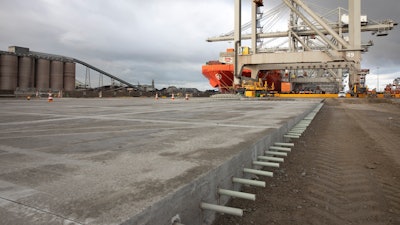The Advantages of Using Composites in Building Products
The Advantages of Using Composites in Building Products
Blog Article
Discovering the Uses and Advantages of Recycled Composites in Modern Industries
In today's swiftly developing commercial landscape, the usage of recycled compounds has amassed enhancing focus for its prospective to redefine traditional manufacturing techniques. The amalgamation of recycled products with advanced composite modern technologies presents an encouraging avenue for boosting sustainability, resilience, and cost-efficiency throughout various markets. As sectors seek cutting-edge remedies to address ecological problems and improve functional efficiencies, the consolidation of recycled compounds becomes a compelling alternative. This change towards lasting practices not only lines up with international conservation initiatives but likewise offers a myriad of benefits that hold the trick to shaping the future of contemporary production techniques.
Ecological Advantages of Recycled Composites
The use of recycled compounds in modern sectors offers considerable ecological benefits, adding to the decrease of waste and the conservation of natural resources. By integrating recycled compounds right into making procedures, sectors can reduce their reliance on virgin materials, thus lowering the quantity of waste produced and the energy required for extraction and manufacturing. This change in the direction of utilizing recycled composites helps in drawing away products from land fills, easing the burden on waste management systems, and reducing greenhouse gas exhausts connected with standard production techniques.
Additionally, making use of recycled composites advertises the conservation of natural deposits such as timber, minerals, and water, which are frequently diminished via the removal and handling of basic materials (composites). By extending the life expectancy of products with recycling, industries can assist preserve ecosystems and biodiversity by reducing the need for new sources. On the whole, the adoption of recycled compounds in contemporary markets plays a vital duty in promoting sustainability and reducing the ecological effect of manufacturing processes
Improved Longevity in Item Production
With a concentrate on long life and robustness, integrating recycled composites right into product manufacturing processes boosts toughness and sustainability. By using recycled compounds, manufacturers can create products that are not only solid yet likewise immune to tear and wear, making them optimal for long-term use in different industries. The mix of different products in recycled composites can frequently result in enhanced toughness and resilience compared to typical materials, providing an affordable service for generating resilient goods.
One of the vital advantages of using recycled composites in item production is the ability to customize the material residential properties to meet certain longevity requirements. By changing the structure and manufacturing strategies, makers can personalize the recycled compounds to hold up against harsh ecological problems, hefty lots, or frequent usage without jeopardizing on efficiency. This versatility in design and manufacturing permits the production of very sturdy products that preserve their integrity with time, minimizing the need for frequent substitutes and inevitably contributing to a much more sustainable production process.
Cost-Effectiveness and Economic Benefits
Integrating recycled composites right into product manufacturing not only boosts longevity and sustainability but additionally uses considerable cost-effectiveness and financial advantages. Utilizing recycled composites can lead to reduced material costs as recycled products are commonly less costly than virgin products. Additionally, recycling composite products can reduce garbage disposal expenses and reduce the requirement for land fill room, adding to total expense financial savings for industries.

Technology and Design Adaptability With Recycled Compounds
Utilizing recycled compounds in contemporary markets offers unmatched possibilities for development and design adaptability. By integrating recycled products right into composite production procedures, companies can push the boundaries of standard style restrictions and check out brand-new possibilities. The versatility of recycled compounds permits the creation of complex forms and frameworks that could not be possible with traditional products.
Among the vital benefits of recycled composites is their ability to be molded into various forms, providing designers the freedom to try out distinct forms and dimensions. composites. This flexibility opens up a globe of innovative chances, allowing the development of lightweight yet resilient products that satisfy the details needs of different industries
Moreover, using recycled compounds promotes sustainable techniques and supports the round economic climate by decreasing waste and lessening the ecological impact of making helpful site processes. This focus on green design services lines up with the expanding pattern towards sustainability in modern sectors, making recycled composites a useful resource for innovative and forward-thinking business.
Applications Throughout Various Industries
Recycled compounds discover impactful and diverse applications across a broad variety of industries due to their one-of-a-kind residential or commercial properties and sustainability advantages. The aerospace market benefits from recycled compounds in the manufacturing of airplane parts, where the materials' strength-to-weight ratio is crucial for guaranteeing safety and security and performance. The flexibility and sustainability of recycled composites make them valuable throughout various markets, driving innovation and environmental stewardship.
Verdict
To conclude, the usage of recycled composites in modern-day markets supplies considerable ecological benefits, boosted durability in item production, cost-effectiveness, and financial advantages. Moreover, using recycled composites enables innovation and design adaptability throughout numerous industries. Overall, the fostering of recycled compounds presents a lasting and useful remedy for meeting the requirements of the industry while likewise lowering ecological influence.

One of the vital advantages of using recycled composites in product production is the capability to customize the material buildings to fulfill particular durability requirements. Using recycled composites can lead to reduced material prices as recycled materials are frequently much less expensive than virgin materials. The aerospace sector advantages from recycled composites in the production of airplane components, where the materials' strength-to-weight proportion is vital for ensuring safety and performance.
Report this page